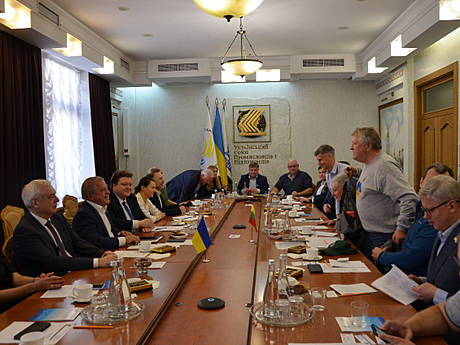
A delegation of the Lithuanian Seimas Economic Committee arrived in the capital of Ukraine. It also included representatives of a number of Lithuanian sectoral associations: builders, grain producers, chambers of commerce and industry, etc.
The visiting committee session started at the Ukrainian League of Industrialists and Entrepreneurs. Lithuanian partners and Ukrainian business associations will work out a basis for further joint work within the framework of several working subgroups. The main objective is to facilitate Ukrainian exports affected by considerable logistical difficulties due to the blockade of Ukrainian ports by Russian troops and the reconstruction of housing.

The Lithuanian Ambassador to Ukraine Valdemaras Sarapinas said that Lithuania certainly supported Ukraine in this difficult period of fighting against Russian aggression and promoted strengthening sanctions against the Kremlin as well as accelerating Ukraine's European integration.
Mr. Kazys Starkevičius, Chair of the Committee, said that 40 thousand Ukrainian refugees had been employed in Lithuania for the last 3 months and conditions had been created for their education and self-development. He emphasized the independence of European countries of Russian gas and oil. According to him, Lithuania purchases neither electricity nor energy resources but it builds terminals for liquefied natural gas. Ukraine could also be channeled to them.
"The war is footdragging now and this is a huge challenge not only for Ukraine's defence capabilities, but also for its economy. It is important for us that our international partners understand the scale of the threats and the time factor. Every day around 100 people are killed in Ukraine, many of them being civilians. 14% of companies have injured workers due to aggressive shelling and attacks by the Russian Federation. 35% of companies are out of business, with $105 billion in infrastructure damage alone. The total scale of losses is $600 billion. 6 million Ukrainians are forced to seek temporary shelter abroad and there are another 8 million internally displaced people. That is why it is important that we already now think about rebuilding Ukraine and lay the foundation for this," Anatolii Kinakh, President of ULIE, said.

He thanked the Lithuanian people for the coherent support of Ukraine. Due to the long-term work of the bilateral Business Council and cooperation with the Confederation of Industrialists of Lithuania the trade turnover between the countries has been constantly increasing to reach $2 billion in 2021. In January-February this year the increase amounted to 48%. It is clear that the war unleashed by Russia has somewhat halted this process but there is a willingness of both Ukraine and Lithuania not only to restore previous projects but also to launch the new ones. These include improving the logistics of Ukrainian exports, digital construction, and implementation of EU standards and regulations in production.
A delegation of the Lithuanian Seimas Economic Committee and Lithuanian business representatives visited the Kiev region and saw with their own eyes the devastation wrought on by Russia in Bucha.
Aivaras Karalius, co-chairman of the Ukraine-Lithuania Business Council, said Lithuania had both the political will and the desire of the private sector to participate in the reconstruction of housing infrastructure. Now the partners are looking for the optimal organizational structure for such assistance, so that it would be as effective and transparent as possible. The main thing is to understand that such projects can be launched before Ukraine starts receiving reconstruction funds from international trust funds. "It could be individual houses or, for example, schools that need to be repaired," said Mr. Karalius. "We need to decide which region, which city we will take care of and sign an agreement," the head of the Lithuanian Builders Association, Dalius Gedvilas, added.
At the same time, Lithuanian colleagues stressed that appropriate market instruments should be elaborated in Ukraine: hryvnia mortgages with a deferral period of up to 30 years and a rate not exceeding 5%. The gap between this rate and the market rate should be compensated by the state and guaranteed for the entire period of mortgage repayment. Ukraine can issue Eurobonds and attract western capital as a source of financing for this initiative.
Dalius Gedvilas also representing the Confederation of Industrialists of Lithuania noted that there are 4 directions, on which Ukraine and Lithuania should work in close communication. These are transport logistics for export, transparency of international reconstruction projects in Ukraine, insurance of risks and property of investors who will come to Ukraine, and digital building.

Members of the Lithuanian Seimas Committee informed ULIE and the representatives of business associations about the initiative they were going to promote to ensure the logistics of the Ukrainian grain and mining and metallurgical exports. At present, the main problem of transportation by rail to the ports of Klaipeda and other European ports is the lack of synchronisation between Ukrainian (wide) railways and European (narrow) railways. Development of narrow tracks in Ukraine will take a long time, and the export issue is critical. Therefore Lithuania suggests extending the Polish to Lithuanian section (450 km in total) and it would be a special wide route which would not waste time and efforts on transshipment of railcars.
ULIE President Anatolii Kinakh invited Lithuanian representatives to join the transport forum in Warsaw to be held next week with the active participation of the Ukrainian League of Industrialists. There they will be able to discuss technical feasibility of such an idea.
"Of course, we are very interested. Previously, we used to ship 4-5 million tons of grain every month through ports; now, due to overland routes, a maximum of 1.5 million tons goes to Europe. This is also an issue of global food security," the leader of the Ukrainian business community said.
The sides agreed that the cooperation between the Ukrainian structured business organisations and the Lithuanian Seimas Economic Committee will continue consistently. This includes the prospect of implementing joint projects to restore the Ukrainian economy.

